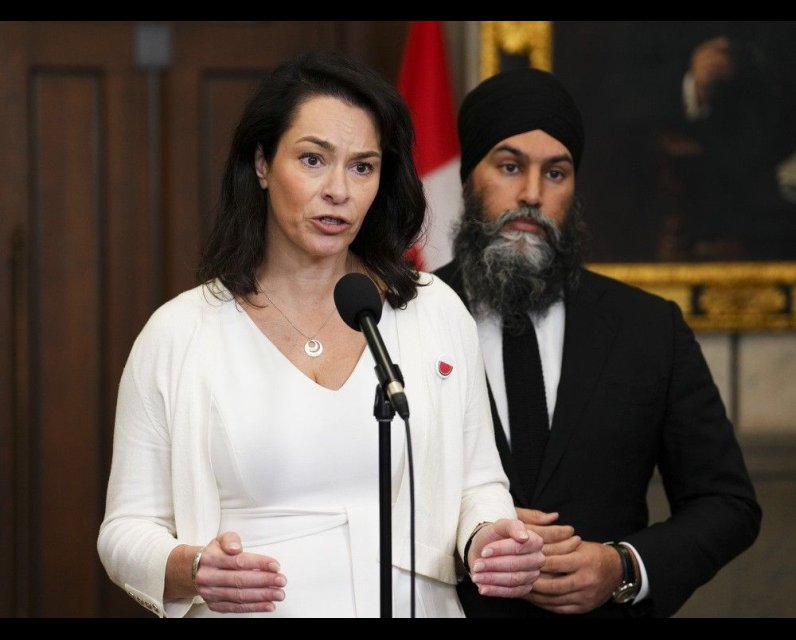The NDP leadership is underway — and the party is limiting signatures from 'cis' men

OTTAWA — Prospective federal NDP leadership candidates will have to raise $100,000 and amass 500 signatures from members — most of which cannot come from cisgender men — to be officially in the running, according to rules that were released on Tuesday.
With the NDP leadership race now underway, candidates who are hoping to succeed Jagmeet Singh should be making themselves known in short order. The winner will be announced in Winnipeg as part of the party’s national convention on March 29, 2026.
For the moment, Edmonton MP Heather McPherson as well as left-wing activists Avi Lewis and Yves Engler are expected to throw their hats in the ring, but others could follow.
In a press release, the NDP said there was “strong interest” in the contest after application packages for prospective candidates were released on August 20, reflecting “members’ enthusiasm for a dynamic and engaging race that will shape the future of the NDP.”
“This leadership race is an exciting opportunity for our members and for people across the country who share progressive values,” said party president Mary Shortall.
“It will spark important conversations about the kind of future we want to build together, rooted in fairness, justice, and hope. I know our members are eager to take part in a contest that is democratic, inclusive, and inspiring for the entire movement,” she added.
Prospective candidates will need to collect at least 500 signatures from party members, including a minimum of 50 from each of five regions — the Atlantic, Quebec, Ontario, the Prairies as well as British Columbia and the territories.
Rules indicate that at least 50 per cent of the total required signatures must be from NDP members who do not identify as a cisgender man — meaning a male whose reported gender corresponds to their reported sex at birth.
The party also requires a minimum of 100 signatures be from “equity-seeking groups” such as racialized members, Indigenous members, members of the LGBTQ+ community and persons living with disabilities.
The party did not immediately respond when asked how officials would reasonably verify if members identified as cisgender men or as being part of “equity-seeking groups.”
Finally, at least 10 per cent of the signatures must come from young New Democrats.
The entry fee for the leadership race has been set at $100,000 to be submitted in four deposits of $25,000. The first payment is due with the submission of nomination signatures, while the last one is due at the membership cut-off date on January 28, 2026.
Prospective candidates must also submit a non-refundable vetting fee of $1,500, according to the rules.
The NDP is also encouraging leadership contestants to sign up new members online instead of using paper memberships and will be providing them with a maximum of 50 paper forms at a time to encourage them to prioritize electronic member sign-ups.
“While paper memberships are a tool to address access and equity concerns for some prospective members, they are also vulnerable to abuse, administratively burdensome, and lead to slower processing of new memberships,” read the rules.
The NDP has not yet determined the exact dates of leadership debates but expects one to be happening in November 2025 and another one in February 2026 in each official language. If there is only one debate, it will be conducted equally in English and in French.
Members will be voting for the new NDP leader in March 2026 using a preferential ballot, meaning delegates will rank candidates in their preferred order.
To win, a candidate must obtain a simple majority of all valid ballots. If it is not achieved on the first count, the contestant with the lowest number of votes will be eliminated. The process will continue until one contestant obtains a simple majority.
The new leader will have the difficult task of rebuilding the party after its worst-ever election result and to ramp up fundraising efforts after the party failed to obtain at least 10 per cent of the votes in ridings which would have partly reimbursed campaign expenses.
In a recent podcast with former TVO host Steve Paikin, NDP interim leader Don Davies admitted that his party had its “worst result” in its history and hinted the NDP should redirect its focus on working people instead of focusing too much on identity politics.
“I think what the NDP has to do is do a really good navel-gazing,” he said. “Are we talking about the right issues that are affecting kitchen tables in Oshawa or Trois-Rivières or Kamloops? Are we really understanding what working people are going through?”
“I’m looking forward to the discussion in our party to see if we can reorient ourselves so we can tell workers, ‘We get you; we’ve got policies that will make your lives better.’”
Davies said he also recognizes that, at the same time, issues facing white, straight male workers are “not the same” as issues facing a worker who is a lesbian and a woman of colour and the party should find a balance between reflecting those different interests.
National Post calevesque@postmedia.com
Our website is the place for the latest breaking news, exclusive scoops, longreads and provocative commentary. Please bookmark nationalpost.com and sign up for our newsletters here.



Comments
In my opinion, this spells the end of the NEW DEMOCRATIC PARTY on a federal level. Stipulating who can nominate prospective leaders based entirely on discrimination is WRONG!